- Home
- Gregory Maguire
The Wicked Years Complete Collection Page 2
The Wicked Years Complete Collection Read online
Page 2
“It’s just such terrible timing.”
“I do think you bear half the blame for the timing,” she said. “I mean, after all, Frex.”
“That’s how the thinking goes, but I wonder.”
“You wonder?” She laughed, her head going far back. The line from her ear to the hollow below her throat reminded Frex of an elegant silver ladle. Even in morning disarray, with a belly like a scow, she was majestically good-looking. Her hair had the bright lacquered look of wet fallen oak leaves in sunlight. He blamed her for being born to privilege and admired her efforts to overcome it—and all the while he loved her, too.
“You mean you wonder if you’re the father”—she grabbed the bedstead; Frex took hold of her other arm and hauled her half-upright—“or do you question the fatherliness of men in general?” She stood, mammoth, an ambulatory island. Moving out the door at a slug’s pace, she laughed at such an idea. He could hear her laughing from the outhouse even as he began to dress for the day’s battle.
Frex combed his beard and oiled his scalp. He fastened a clasp of bone and rawhide at the nape of his neck, to keep the hair out of his face, because his expressions today had to be readable from a distance: There could be no fuzziness to his meaning. He applied some coal dust to darken his eyebrows, a smear of red wax on his flat cheeks. He shaded his lips. A handsome priest attracted more penitents than a homely one.
In the kitchen yard Melena floated gently, not with the normal gravity of pregnancy but as if inflated, a huge balloon trailing its strings through the dirt. She carried a skillet in one hand and a few eggs and the whiskery tips of autumn chives in the other. She sang to herself, but only in short phrases. Frex wasn’t meant to hear her.
His sober gown buttoned tight to the collar, his sandals strapped on over leggings, Frex took from its hiding place—beneath a chest of drawers—the report sent to him from his fellow minister over in the village of Three Dead Trees. He hid the brown pages within his sash. He had been keeping them from his wife, afraid that she would want to come along—to see the fun, if it was amusing, or to suffer the thrill of it if it was terrifying.
As Frex breathed deeply, readying his lungs for a day of oratory, Melena dangled a wooden spoon in the skillet and stirred the eggs. The tinkle of cowbells sounded across the lake. She did not listen; or she listened but to something else, to something inside her. It was sound without melody—like dream music, remembered for its effect but not for its harmonic distresses and recoveries. She imagined it was the child inside her, humming for happiness. She knew he would be a singing child.
Melena heard Frex inside, beginning to extemporize, warming up, calling forth the rolling phrases of his argument, convincing himself again of his righteousness.
How did that proverb go, the one that Nanny singsonged to her, years ago, in the nursery?
Born in the morning,
Woe without warning;
Afternoon child
Woeful and wild;
Born in the evening,
Woe ends in grieving.
Night baby borning
Same as the morning.
But she remembered this as a joke, fondly. Woe is the natural end of life, yet we go on having babies.
No, said Nanny, an echo in Melena’s mind (and editorializing as usual): No, no, you pretty little pampered hussy. We don’t go on having babies, that’s quite apparent. We only have babies when we’re young enough not to know how grim life turns out. Once we really get the full measure of it—we’re slow learners, we women—we dry up in disgust and sensibly halt production.
But men don’t dry up, Melena objected; they can father to the death.
Ah, we’re slow learners, Nanny countered. But they can’t learn at all.
“Breakfast,” said Melena, spooning eggs onto a wooden plate. Her son would not be as dull as most men. She would raise him up to defy the onward progress of woe.
“It is a time of crisis for our society,” recited Frex. For a man who condemned worldly pleasures he ate with elegance. She loved to watch the arabesque of fingers and two forks. She suspected that beneath his righteous asceticism he possessed a hidden longing for the easy life.
“Every day is a great crisis for our society.” She was being flip, answering him in the terms men use. Dear thick thing, he didn’t hear the irony in her voice.
“We stand at a crossroads. Idolatry looms. Traditional values in jeopardy. Truth under siege and virtue abandoned.”
He wasn’t talking to her so much as practicing his tirade against the coming spectacle of violence and magic. There was a side to Frex that verged on despair; unlike most men, he was able to channel it to benefit his life’s work. With some difficulty she set herself down on a bench. Whole choruses were singing wordlessly inside her head! Was this common for every labor and delivery? She would have liked to ask the nosy local women who would come around this afternoon, growling shyly at her condition. But she didn’t dare. She couldn’t jettison her pretty accent, which they found affected—but she could avoid sounding ignorant about these basic matters.
Frex noticed her silence. “You’re not angry I’m leaving you today?”
“Angry?” She raised her eyebrows, as if she had never encountered the concept before.
“History crawls along on the peg legs of small individual lives,” said Frex, “and at the same time larger eternal forces converge. You can’t attend to both arenas at once.”
“Our child may not have a small life.”
“Now isn’t the time to argue. Do you want to distract me from holy work today? We’re facing the presence of real evil in Rush Margins. I couldn’t live with myself if I ignored it.” He meant this, and for such intensity she had fallen in love with him; but she hated him for it too, of course.
“Threats come—they’ll come again.” Her last word on the subject. “Your son will only be born once, and if this watery upheaval inside is any indication, I think it’s today.”
“There will be other children.”
She turned away so he could not see the rage in her face.
But she couldn’t sustain the fury at him. Perhaps this was her moral failing. (She wasn’t much given to worrying about moral failings as a rule; having a minister as a husband seemed to stir enough religious thought for one couple.) She lapsed sullenly into silence. Frex nibbled at his meal.
“It’s the devil,” said Frex, sighing. “The devil is coming.”
“Don’t say a thing like that on a day our child is expected!”
“I mean the temptation in Rush Margins! And you know what I mean, Melena!”
“Words are words, and what’s said is said!” she answered. “I don’t require all your attention, Frex, but I do need some of it!” She dropped the skillet with a crash on the bench that stood against the cottage wall.
“Well, and likewise,” he said. “What do you think I’m up against today? How can I convince my flock to turn away from the razzle-dazzle spectacle of idolatry? I will probably come back tonight having lost to a smarter attraction. You might achieve a child today. I look forward to failure.” Still, as he said this he looked proud; to fail in the cause of a high moral concern was satisfying to him. How could it compare with the flesh, blood, mess, and noise of having a baby?
He stood at last to leave. A wind came up over the lake now, smudging the topmost reaches of the columns of kitchen smoke. They looked, thought Melena, like funnels of water swirling down drains in narrowing, focusing spirals.
“Be well, my love,” said Frex, although he had his stern public expression on, from forehead to toes.
“Yes.” Melena sighed. The child punched her, deep down, and she had to hurry to the outhouse again. “Be holy, and I’ll be thinking of you—my backbone, my breastplate. And also try not to be killed.”
“The will of the Unnamed God,” said Frex.
“My will too,” she said, blasphemously.
“Apply your will to that which deserves it,” he answered. N
ow he was the minister and she the sinner, an arrangement she did not particularly enjoy.
“Good-bye,” she said, and chose the stink and relief of the outhouse over standing to wave him out of sight as he strode along the road to Rush Margins.
The Clock of the Time Dragon
Frex was more concerned for Melena than she knew. He stopped at the first fisherman’s hut he saw and spoke with the man at the half-door. Could a woman or two spend the day and if needed the night with Melena? It would be a kindness. Frex nodded with a wince of gratitude, acknowledging without words that Melena was not a great favorite in these parts.
Then, before continuing around the end of Illswater and over to Rush Margins, he stopped at a fallen tree and drew two letters from his sash.
The writer was a distant cousin of Frex’s, also a minister. Weeks earlier the cousin had spent time and valuable ink on a description of what was being called the Clock of the Time Dragon. Frex prepared himself for the day’s holy campaign by rereading about the idol clock.
I write in haste, Brother Frexspar, to catch my impressions before they fade.
The Clock of the Time Dragon is mounted on a wagon and stands as high as a giraffe. It is nothing more than a tottering, freestanding theatre, punched on all four sides with alcoves and proscenium arches. On the flat roof is a clockwork dragon, an invention of green painted leather, silvery claws, ruby jeweled eyes. Its skin is made of hundreds of overlapping discs of copper, bronze, and iron. Beneath the flexible folds of its scales is an armature controlled by clockwork. The Time Dragon circles on its pedestal, flexes its narrow leathery wings (they make a sound like a bellows), and belches out sulfurous balls of flaming orange stink.
Below, featured in the dozens of doorways, windows, and porches, are puppets, marionettes, figurines. Creatures of folk tale. Caricatures of peasants and royalty alike. Animals and fairies and saints—our unionist saints, Brother Frexspar, stolen out from underneath us! I get enraged. The figures move on sprockets. They wheel in and out of doorways. They bend at the waist, they dance and dawdle and dally with each other.
Who had engendered this Time Dragon, this fake oracle, this propaganda tool for wickedness that challenged the power of unionism and of the Unnamed God? The clock’s handlers were a dwarf and some narrow-waisted minions who seemed to have only enough brain capacity among them to pass a hat. Who else was benefiting besides the dwarf and his beauty boys?
The cousin’s second letter had warned that the clock was making its way next to Rush Margins. It had told a more specific story.
The entertainment began with a thrum of strings and a rattle of bones. The crowd pushed close, oohing. Within the lighted window of a stage, we saw a marriage bed, with a puppet wife and husband. The husband was asleep and the wife sighed. She made a motion with her carved hands to suggest that her husband was disappointingly small. The audience shrieked with laughter. The puppet wife went to sleep herself. When she was snoring, the puppet husband sneaked out of bed.
At this point, up above, the Dragon turned on its base, and pointed its talons into the crowd, indicating—without a doubt—a humble well digger named Grine, who has been a faithful if inattentive husband. Then the dragon reared back and stretched two fingers in a come-hither gesture, isolating a widow named Letta and her snaggle-toothed maiden daughter. The crowd hushed and fell away from Grine, Letta, and the blushing maid, as if they had suddenly been inflicted with running sores.
The Dragon rested again but draped a wing over another archway, which lit up to reveal the puppet husband, wandering out in the night. Along came a puppet widow, with sprigged hair and high color, dragging along a protesting, flinty-toothed daughter. The widow kissed the puppet husband, and pulled off his leather trousers. He was equipped with two full sets of male goods, one in the front and another hanging off the base of his spine. The widow positioned her daughter on the abbreviated prong in the front, and herself took advantage of the more menacing arrangement in the rear. The three puppets bucked and rocked, emitting squeals of glee. When the puppet widow and her daughter were through, they dismounted and kissed the adulterous puppet husband. Then they kneed him, simultaneously, fore and aft. He swung on springs and hinges, trying to hold all his wounded parts.
The audience roared. Grine, the actual well digger, sweated drops as big as grapes. Letta pretended to guffaw, but her daughter had already disappeared from shame. Before the evening was out, Grine was set upon by his agitated neighbors and investigated for the grotesque anomaly. Letta was shunned. Her daughter seems to have vanished entirely. We suspect the worst.
At least Grine wasn’t killed. Yet who can say how our souls have been stamped by witnessing such a cruel drama? All souls are hostages to their human envelopes, but souls must decay and suffer at such indignity, don’t you agree?
Sometimes it seemed to Frex that every itinerant witch and toothless gibbering seer in Oz who could perform even the most transparent of spells had seized on the outback district of Wend Hardings to scratch out a trade. He knew that folks from Rush Margins were humble. Their lives were hard and their hopes few. As the drought dragged on, their traditional unionist faith was eroding. Frex was aware that the Clock of the Time Dragon combined the appeals of ingenuity and magic—and he would have to call on his deepest reserves of religious conviction to overcome it. If his congregation should prove vulnerable to the so-called pleasure faith, succumbing to spectacle and violence—well, what next?
He would prevail. He was their minister. He had pulled their teeth and buried their babies and blessed their kitchen pots for years now. He had abased himself in their names. He had wandered with an unkempt beard and a begging bowl from hamlet to hamlet, leaving poor Melena alone in the minister’s lodge for weeks at a time. He had sacrificed for them. They couldn’t be swayed by this Time Dragon creature. They owed him.
He moved on, shoulders squared, jaw set, stomach in a sour uproar. The sky was brown with flying sand and grit. The wind rushed high over the hills with the sound of a tremulous wail, as if pushing through some fissure of rock, on a ridge beyond any Frex could see.
The Birth of a Witch
It was nearly evening by the time Frex had worked up the courage to enter the ramshackle hamlet of Rush Margins. He was in a deep sweat. He hit his heels to the ground and pumped his clenched fists, and called out in a hoarse, carrying tone. “Hist, oh ye of small confidence! Gather while ye may, for temptation is abroad, to try ye sorely!” The words were archaic, even ridiculous, but they worked. Here came the sullen fishermen, dragging their empty nets up from the dock. Here came the subsistence farmers, whose hardscrabble plots had borne little during this dry year. Before he had even begun, they all looked guilty as sin.
They followed him to the rickety steps of the canoe repair house. Frex knew that everyone expected this evil clock to arrive at any instant; gossip was as contagious as the plague. He yelled at them for their thirsty anticipation. “Ye are dull as toddlers reaching their hands to touch the pretty embers! Ye are as if spawn of dragon womb, ready to suck on teats of fire!” These were time-worn scriptural imprecations and they fell a little flat tonight; he was tired and not at his best.
“Brother Frexspar,” said Bfee, the mayor of Rush Margins, “could you perhaps tone down your harangue until we get a chance to see what fresh new form temptation might take?”
“You have no mettle to resist new forms,” said Frex, spitting.
“Haven’t you been our able teacher these several years?” said Bfee. “We’ve hardly had such a good chance to prove ourselves against sin! We’re looking forward to—to the spiritual test of it all.”
The fishermen laughed and jeered, and Frex intensified his glower, but at the sound of unfamiliar wheels in the stony ruts of the road, they all turned their heads and fell silent. He had lost their attention before he had gotten started.
The clock was being drawn by four horses and escorted by the dwarf and his cohort of young thugs. Its broad roof was crowned by
the dragon. But what a beast! It looked poised as if ready to spring, as if indeed invested with life. The skin of the house was decorated in carnival colors, burnished with gold leaf. The fishermen gaped as it drew near.
Before the dwarf could announce the time of the performance, before the crowd of youths could draw out their clubs, Frex leaped on the lower step of the thing—a fold-down stage on hinges. “Why is this thing called a clock? The only clock face it has is flat, dull, and lost in all that distracting detail. Furthermore, the hands don’t move: Look, see for yourselves! They’re painted to remain at one minute before midnight! All you’ll see here is mechanics, my friends: I know this for a fact. You’ll see mechanical cornfields growing, moons waxing and waning, a volcano to spew a soft red cloth done up with black and red sequins. With all this tiktok-y business, why not have a pair of circulating arms on the clock face? Why not? I ask you, I’m asking you, yes, you, Gawnette, and you, Stoy, and you, Perippa. Why no real clock here?”
They were not listening, Gawnette and Stoy and Perippa, nor were the others. They were too busy staring in anticipation.
“The answer, of course, is that the clock isn’t meant to measure earthly time, but the time of the soul. Redemption and condemnation time. For the soul, each instant is always a minute short of judgment.
“One minute short of judgment, my friends! If you died in the next sixty seconds, would you want to spend eternity in the suffocating depths reserved for idolaters?”
“Awful lot of noise in the neighborhood tonight,” said someone in the shadows—and the spectators laughed. Above Frex—he whirled to see—from a little door had emerged a small, yapping puppet dog, its hair dark and as tightly curled as Frex’s own. The dog bounced on a spring, and the pitch of its chatter was annoyingly high. The laughter grew. Evening fell harder, and it was less easy for Frex to tell who was laughing, who now was shouting for him to move aside so they could see.

 Missing Sisters
Missing Sisters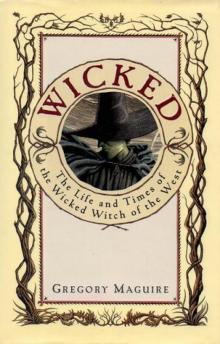 Wicked: The Life and Times of the Wicked Witch of the West
Wicked: The Life and Times of the Wicked Witch of the West After Alice
After Alice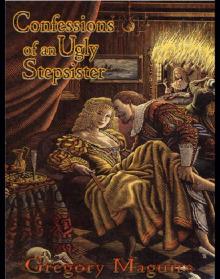 Confessions of an Ugly Stepsister
Confessions of an Ugly Stepsister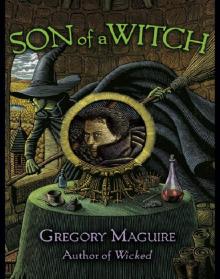 Son of a Witch
Son of a Witch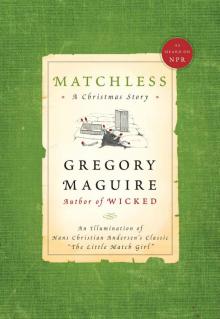 Matchless
Matchless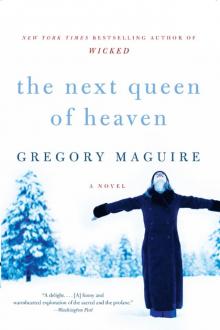 The Next Queen of Heaven
The Next Queen of Heaven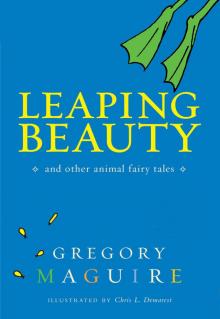 Leaping Beauty: And Other Animal Fairy Tales
Leaping Beauty: And Other Animal Fairy Tales Hiddensee: A Tale of the Once and Future Nutcracker
Hiddensee: A Tale of the Once and Future Nutcracker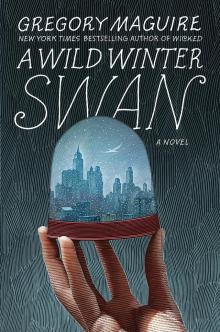 A Wild Winter Swan
A Wild Winter Swan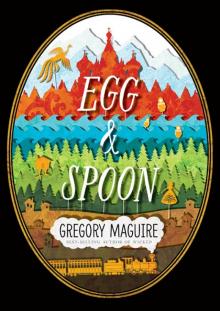 Egg & Spoon
Egg & Spoon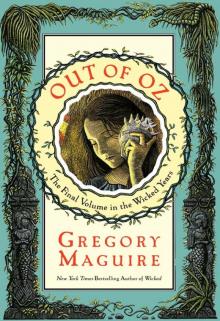 Out of Oz
Out of Oz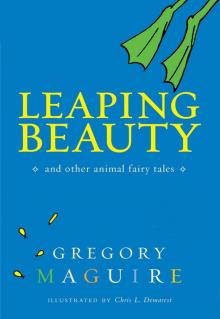 Leaping Beauty
Leaping Beauty Hiddensee
Hiddensee The Wicked Years Complete Collection
The Wicked Years Complete Collection The Next Queen of Heaven: A Novel
The Next Queen of Heaven: A Novel